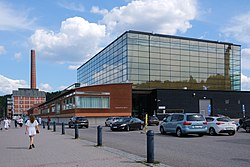This article includes a list of references, related reading, or external links, but its sources remain unclear because it lacks inline citations .(May 2024) |
You can help expand this article with text translated from the corresponding article in Finnish. (June 2023)Click [show] for important translation instructions.
|


The Sibelius Hall (Finnish : Sibeliustalo) is a concert hall in Lahti, Finland, named for the composer Jean Sibelius. The concert hall was completed in 2000. Architects Kimmo Lintula and Hannu Tikka designed the hall, which is made out of glulam. The acoustics were engineered by Artec Consultants, New York. Its acoustics are one of its strongest points, while the architecture follows the Scandinavian tradition of sophisticated design. The concert hall has a capacity of 1,250 seats.
The Sibelius Hall is home to the Lahti Symphony Orchestra.